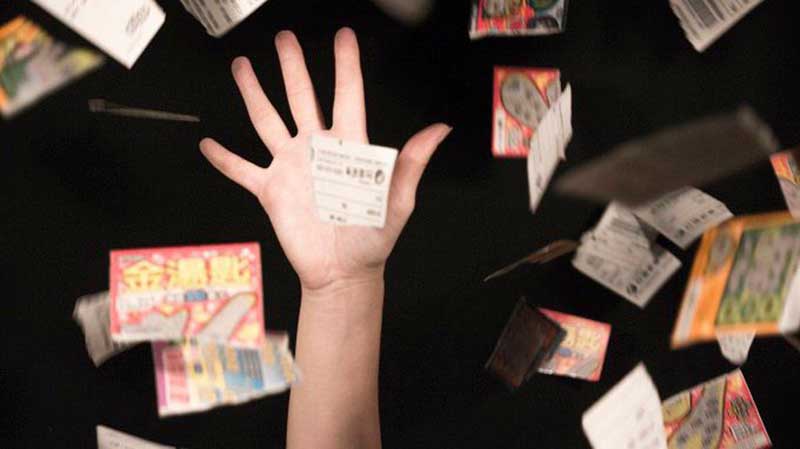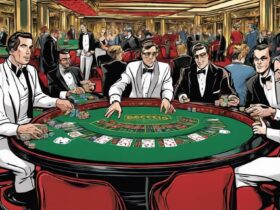Have you ever wondered why the lottery is not classified as gambling? While both activities involve the possibility of winning or losing money, there are several factors that set the two apart. Let’s explore the reasons behind this unique distinction.
The lottery has always been a popular form of entertainment, with millions of people participating in various lotteries around the world. Despite its similarities to gambling, the lottery is not classified as such due to several reasons, including legal distinctions, social attitudes, and economic impact.
While gambling involves risking money on games of chance or skill, the lottery is primarily seen as a game of chance where the outcome is determined purely by luck. Additionally, governments typically regulate and oversee lotteries, while traditional forms of gambling are often controlled by private enterprises.
These factors, along with others that we will explore in this article, contribute to the lottery’s separate classification from gambling and highlight its unique nature as a game of chance that generates public benefit.
Key Takeaways:
- The lottery is not considered gambling due to legal distinctions, social attitudes, and economic impact.
- The lottery is primarily seen as a game of chance where the outcome is determined purely by luck.
- Governments typically regulate and oversee lotteries, while traditional forms of gambling are often controlled by private enterprises.
Defining Gambling and the Lottery
Before we explore why the lottery is not considered gambling, it is essential to define both concepts and establish their differences. Gambling refers to any activity in which a person wagers something of value in the hopes of winning a reward or prize.
On the other hand, a lottery is a specific type of gambling that involves purchasing a ticket or entry into a game where the winner is selected by a random drawing or other chance-based methods. While both gambling and lotteries involve risk-taking and the potential for profit, there are significant distinctions between the two.
For example, the primary difference between lottery and gambling is the level of skill involved. Most forms of gambling require some degree of skill, strategy, or expertise, such as card games like poker or blackjack. In contrast, lotteries are primarily based on chance, with no skill or strategy involved in winning the game.
Another difference is the type of rewards offered. In most forms of gambling, the goal is to win money or other material prizes. In contrast, lotteries often offer non-tangible rewards such as experiences, trips, or even just the satisfaction of being a winner.
Finally, there are differences in terms of regulation. While both gambling and lotteries are heavily regulated, lotteries are usually subject to more stringent rules and regulations. For example, the federal government has established a specific regulatory framework for lotteries, which sets them apart from other forms of gambling.
“While both gambling and lotteries involve risk-taking and the potential for profit, there are significant distinctions between the two.”
These distinctions help to explain why the lottery is not classified as a form of traditional gambling. In the following sections, we will explore these distinctions in greater detail, as well as other factors that contribute to the separate classification of lotteries.
The Element of Chance in the Lottery
One of the key factors that sets the lottery apart from traditional forms of gambling is the element of chance. While some forms of gambling involve skill or strategy, the outcome of the lottery is determined purely by luck. This aspect makes the lottery a unique game of chance that differs from other forms of gambling.
Lotteries typically involve players purchasing tickets with numbers on them. The winning numbers are then drawn at random, with the winning ticket holders receiving a prize. This process is entirely based on chance, with no skill or strategy involved in selecting the winning numbers. As a result, the lottery is often seen as a game of luck, where the odds of winning depend solely on chance.
The element of chance in the lottery can be both exciting and frustrating for players. On the one hand, the thrill of potentially winning a large sum of money can be alluring. On the other hand, the odds of winning a major lottery jackpot are usually quite low, leading to disappointment for many players.
Despite the unpredictable nature of the lottery, it remains a popular form of entertainment for millions of people around the world. Its distinction from other forms of gambling based on skill or strategy only adds to its unique appeal.
Legal Considerations
According to the law, lotteries are not considered gambling because they are state-run and operated for the purpose of generating revenue for government programs, rather than for private profit. The legal definition of gambling involves risking something of value on an uncertain outcome with the goal of winning something of value in return. Lotteries, on the other hand, involve purchasing a ticket with the chance of winning a prize, without risking any personal property or possessions.
This legal distinction makes the lottery fundamentally different from traditional forms of gambling, including casinos, sports betting, and poker. These forms of gambling are typically operated by private companies, rather than the state, and involve direct betting or wagering between individuals. In addition, these types of gambling often involve skill or strategy, as opposed to the lottery which is purely based on chance.
| Lottery | Traditional Gambling |
|---|---|
| State-run | Privately operated |
| No personal risk | Personal risk involved |
| Chance-based | Skill or strategy-based |
Furthermore, lotteries are subject to specific regulations and oversight to ensure fairness and transparency, such as random number generators and public drawings. This level of regulation is not typically found in traditional gambling establishments.
Overall, the legal considerations surrounding lotteries versus traditional gambling highlight the unique nature of the lottery as a state-run revenue generator, as opposed to a private profit-driven enterprise. This is a key factor in why the lottery is not considered gambling.

The Role of Social Perceptions and Attitudes
When it comes to understanding why the lottery is not considered gambling, social perceptions and attitudes play a critical role. Unlike traditional gambling, the lottery is often viewed as a more benign form of entertainment that does not carry the same negative connotations. But why do people see the lottery as different from gambling?
One possible reason is the fact that the lottery is widely accepted and supported by many communities and organizations. In contrast to gambling, which is often seen as a vice or addiction, the lottery is often framed as a harmless pastime that can be enjoyed by anyone, regardless of their socio-economic background or personal history.
Another factor is the public perception of the lottery as a tool for positive social change. Unlike gambling, which is often associated with organized crime or other illicit activities, the lottery is often promoted as a way to support various public services, such as education, healthcare, and infrastructure. In fact, many states use lottery revenue to fund important initiatives that benefit the community as a whole.
“The lottery is seen as a form of entertainment rather than gambling.”
Furthermore, the lottery is often marketed as a form of entertainment that is accessible to everyone. This perception is supported by the fact that lottery tickets are relatively inexpensive and widely available at many retail locations and online platforms. Additionally, many lotteries offer exciting promotions and prizes, which further contribute to the perception of the lottery as a fun and engaging activity that is distinct from traditional forms of gambling.
The infographic below summarizes the key reasons why people see the lottery as different from gambling:
| Reasons Why People See the Lottery as Different from Gambling | Examples |
|---|---|
| The lottery is legal and widely accepted | -Many states have their own lotteries and promote them as a legitimate way to support public services |
| The lottery is perceived as a tool for positive social change | -Lottery proceeds are often used to fund education, healthcare, and infrastructure initiatives |
| The lottery is marketed as a form of entertainment | -Lottery tickets are relatively inexpensive and widely available -Many lotteries offer exciting promotions and prizes that contribute to the perception of the lottery as a fun and engaging activity |
Overall, social perceptions and attitudes play a critical role in why the lottery is not considered gambling. By understanding these perspectives, we can gain deeper insights into the unique nature of the lottery and why it remains distinct from traditional forms of gambling.
The Economic Impact and Public Benefit of Lotteries
One significant distinction between lotteries and traditional forms of gambling is the economic impact and public benefit generated by lotteries. When people buy lottery tickets, they are not just hoping to win big; they are also contributing to crucial public services such as education and infrastructure development.
To understand the economic impact of lotteries, let’s take a look at some statistics. According to the North American Association of State and Provincial Lotteries, in 2018 alone, lotteries generated a total of $81.2 billion in sales. From this amount, $23.4 billion were allocated to various state causes, including education, health, veterans’ services, and environmental protection. Furthermore, lotteries are responsible for creating jobs, both directly and indirectly. According to the National Conference of State Legislatures (NCSL), the lottery industry supports approximately 175,000 jobs in the United States alone.
It is not just the economic impact that sets lotteries apart from traditional gambling but also the public benefit that is generated by lottery proceeds. While traditional gambling establishments focus solely on profit, lotteries are run by state and provincial governments to generate revenue earmarked for public services. According to the NCSL, lotteries provide a crucial source of funding for many state budgets, with proceeds being allocated to a wide range of programs from healthcare to transportation.
The public benefit generated by lotteries cannot be overstated. In Florida, for instance, lottery proceeds go towards funding the Bright Futures Scholarship Program, which provides financial assistance to students who meet certain academic requirements. In Texas, lottery funds are used to support the Foundation School Program, which supports public education throughout the state. The lottery also provides an opportunity for charitable causes to receive funding. For instance, the New York State Lottery offers a special scratch-off ticket called “Mission Accomplished,” with proceeds going towards supporting veterans’ organizations.
In conclusion, the economic impact and public benefit generated by lotteries set them apart from traditional gambling establishments. Lotteries provide a crucial source of funding for public services, help create jobs, and support a wide array of essential programs. When people buy lottery tickets, they are not just hoping to win big – they are also contributing to a better future for their communities.
The Psychological Perception and Entertainment Value of the Lottery
One of the reasons why the lottery is not considered gambling is its psychological perception and entertainment value. Unlike traditional forms of gambling, the lottery is often viewed as a harmless and enjoyable form of entertainment, rather than a high-stakes game of chance.
Part of the reason for this perception is the way in which lotteries are marketed and promoted. Many lotteries use catchy slogans and bright, colorful graphics to create a fun and exciting image. Advertisements often emphasize the potential for a life-changing win, but also stress the low odds of actually winning, creating a sense of excitement and suspense.
Another factor is the social aspect of the lottery. Playing the lottery is often a communal experience, with friends, family, and co-workers pooling their money together to purchase tickets. This creates a sense of camaraderie and shared excitement, further enhancing the entertainment value of the lottery.
Research has also shown that playing the lottery can have positive psychological effects, such as reducing stress and anxiety. A study published in the Journal of Gambling Studies found that lottery players experienced higher levels of positive emotions and lower levels of negative emotions compared to non-players.
Overall, the psychological perception and entertainment value of the lottery contribute to its unique classification as a separate entity from traditional forms of gambling. While it still involves an element of chance, the lottery is seen as a fun and harmless form of entertainment that can have positive effects on players’ psychological well-being.
Conclusion
In conclusion, understanding why the lottery is not considered gambling involves exploring several important factors.
Legal distinctions
Lotteries are typically regulated by separate laws and regulations from traditional gambling, such as casinos and sports betting. These legal distinctions contribute to the separate classification of lotteries.
Element of chance
The lottery is primarily based on chance and luck, as opposed to certain forms of gambling that involve skill or strategy. This key aspect also sets it apart from other types of gambling.
Social perceptions and attitudes
Cultural and societal factors also play a role in the separate classification of the lottery. Many people view it as a distinct form of entertainment rather than gambling, due to its widespread availability and association with public benefit.
Economic impact and public benefit
Lotteries also generate revenue for various public services, such as education and infrastructure, that distinguish them from traditional gambling enterprises focused solely on profit.
By รวมทางเข้า เว็บหวย ล่าสุด understanding these factors, we can appreciate the unique nature of the lottery as a game of chance that is distinct from other forms of gambling. Whether we choose to play the lottery or not, it remains an interesting and significant aspect of our cultural landscape.
FAQ
Why is the lottery not considered gambling?
The lottery is not considered gambling due to legal distinctions, the element of chance, social perceptions, economic impact, and public benefit.
What is the difference between the lottery and gambling?
While both involve games of chance, the lottery is a specific form of gambling where the outcome is determined purely by luck.
Why do people see the lottery as different from gambling?
The lottery is viewed differently from gambling due to cultural and societal factors that shape perceptions and attitudes towards the game.
Why is the lottery not classified as gambling?
The lottery is not classified as gambling because of legal regulations that distinguish it as a separate entity from traditional forms of gambling.
How is the lottery seen as a game of chance?
The lottery is primarily seen as a game of chance because the outcome is determined purely by luck, without any involvement of skill or strategy.
What are the legal considerations that make the lottery different from gambling?
The lottery is subject to specific laws and regulations that govern its operation, setting it apart from traditional forms of gambling.
Why is the lottery perceived as entertainment rather than gambling?
Many people perceive the lottery as a form of entertainment due to the excitement and anticipation it brings, rather than viewing it solely as a gambling activity.
How does the lottery contribute to public benefit?
Lottery proceeds are often directed towards various public services, such as education and infrastructure, which distinguishes lotteries from gambling enterprises focused solely on profit.














Got a Questions?
Find us on Socials or Contact us and we’ll get back to you as soon as possible.